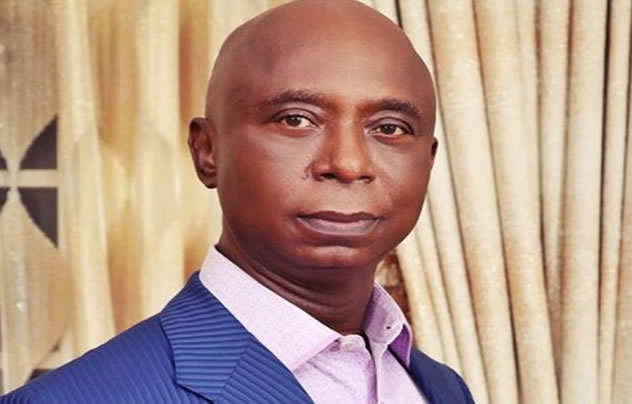NEWS
Enugu Strengthens ‘One Health Approach’ to Deal with Emerging Animal, Human Health Challenges

From Sylvia Udegbunam, Enugu
The Enugu State Government said it will continue to strengthen “One Health Approach” to deal with existing and emerging animal health, human health and environmental health challenges confronting the state.Governor Peter Mbah gave the assurance on Monday in Enugu at two-day training on Disease Monitoring and Investigation Using the One Health Risk Communication Approach and the National Action Plan on Health Security (NAPHS) Implementation.
The training, which is being organised by the Livestock Productivity and Resilience Support Project (L-PRES) Coordination Center, Enugu State, was meant for One Health Officers in Enugu State.Represented by the state Commissioner for Agriculture and Agro-Industrialisation, Patrick Ubru, the governor said that the training marked an important step in the ongoing efforts of the government to strengthen animal, human and environmental health services.According to him, the training will also improve disease surveillance, and enhance multisectoral collaboration through the “One Health Approach”.”The theme of this workshop: Disease Monitoring and Investigation using One Health Risk Communication and Implementation Approach and the National Action Plan for Health Security (NAPHS) is both timely and strategic.”The global rise in zoonotic diseases and public health threats has shown us clearly that we must break down the barriers between humans, animals and environmental health systems.”The One Health Approach framework offers a unified and collaborative solution to these complex challenges.”Veterinary officers, para-veterinary professionals, and community animal health workers are vital frontline defenders in this system.”Your ability to detect, report and respond to animal health threats not only protects livestock and rural livelihoods but also plays a critical role in preventing larger public health crises to both animals and humans,” he said.Mbah also commended the Federal Government through L-PRES Coordination Center for its continued commitment to building capacity and strengthening the livestock sector.”I thank the facilitators, technical partners and participants for your dedication to this cause. I urge participants to make the most of this training; share experiences, embrace the tools and strategies being offered, and take knowledge back to communities”.Enugu State Project Coordinator of L-PRES, Dr Ifeyinwa Nnajieze said that the training would focus on the critical importance of collaboration and integration in addressing health challenges that transcend human, animal and environmental domains.Nnajieze noted that the “One Health Approach” recognised that human health, animal health and environmental health are intricately linked, adding that by working together, “we can better understand and address complex health issues.””The training is to enhance the collaborative capacity of veterinary officers, para-veterinarians, community animal health and husbandry workers in identifying, monitoring and investigating potential disease outbreaks in animals, with a focus on interconnectedness of human, animal and environmental health.”Nnajieze noted that the training would revive state level Occupational Health technical working groups that cut across the tripartite; and expose participants to their basic requirements and responsibilities as clearly contained in the National Action Plan for Health Security (NAPHS 01).”I appreciate Gov. Mbah for approving the training. I thank the participants for their contributions and state government dedication to the “One Health Approach” in shaping a healthier future for Enugu State Livestock sector,” she said.Team Lead of National Technical Working Group on L-PRES, Dr John Maiye, noted that the “One Health Approach” had become necessary as “about 75 per cent of diseases that affect human health are from animals.”Maiye said that the approach focuses on a holistic and coordinated treatment of health issues both in animal and human through human health, animal health and environmental health sectors.”The One Health Approach calls for an interface between human health, animal health and environmental health officers to eradicate zoonotic diseases, which affects animal and human population; thus, promoting inclusive and general health,” he said.NEWS
Insecurity: Benue LG Boss Bans Forest Logging Activities

The Chairman, Agatu Local Government Area (LGA) of Benue, Mr Melvin Ejeh, has imposed an immediate and comprehensive ban on all forest logging activities in Agatu West.Ejeh, in a statement on Sunday, said that the declaration was another resolute effort to address the escalating security concerns that have beset the LGA.
The chairman said that the directive takes immediate effect and it was imperative that all stakeholders and residents adhere to the policy with utmost seriousness. “The decision to impose this ban is informed by the alarming rate of insecurity that has plagued our area, largely exacerbated by the unregulated activities of loggers.“The incessant logging has not only led to severe environmental degradation but has also created avenues for criminal elements to operate with impunity.“The resultant effect is a heightened sense of insecurity, which has become a source of grave concern for us all.“In light of this, it has become imperative for us to take decisive action to safeguard the well-being and safety of our residents.“The ban on logging activities is a proactive measure aimed at mitigating the security risks associated with unregulated logging,” he said.Ejeh stated that the ban would also contribute to the preservation of the environment and the protection of natural resources for future generations.The chairman emphasised that the ban was non-negotiable, and any individual or group found engaging in logging activities without proper authorisation would face the full weight of the law.According to him, all logging activities henceforth requires clearance from the local government chairman himself.He urged all residents to comply with this directive and report any logging activities to the council authorities.“Your cooperation and vigilance are crucial in our collective efforts to create a safer and more secure environment for all.“I assure you that Agatu Local Government Council remains committed to ensuring the safety and well-being of all residents.“We will continue to work tirelessly to address the security challenges facing our area and implement measures that promote peace and stability,” he added. (NAN)NEWS
Make Teacher a Model – NUT Urges Tinubu

The Nigeria Union of Teachers (NUT), has urged President Bola Tinubu to priotise teacher’s values and welfare to make the profession more attractive for younger generation.The National President of NUT, Comrade Audu Amba, made the appeal in an interview in Abuja.He urged the government to make teacher a model and recognise the teaching profession as a pillar of societal advancement.
Amba frowned at the current situation where teaching is made a “Hobson’s choice” among admission and job seekers – an option not because it’s your preferred choice, but because it’s the only option available after others have been filled. He said deliberate policies should be made to place teacher’s seat in frontal rows of other professions and teaching profession a preferred choice for youths.Amba said many students had little or no passion for teaching profession and this was most demonstrated when a candidate scores low marks in the Unified Tertiary Matriculation Examination (UTME).According to him, when a candidate scores below the cut-off marks of first and second choice courses, he or she is often compelled to study education in other not to loose admission for the year“Today in our secondary schools everybody is scrambling to get 300 and above in the UTME so that he or she can read medicine.“The university system made it clear that before you read .Medicine, you must score 300 marks and above. Why is such rules not applicable to Education?“Those students that want to read Medicine to become Doctor, who taught and will still teach them, is it not the teacher?,” he retorted.According to him, if the teacher is not sound, how could he or she impact the needed knowledge and training the child needs to study medicine?“It should be that the best candidate that got 300 scores that should study education and teach.“That is what is happening in some of the countries that have decided to change their direction, and that’s why they are getting it right.“A teacher should be very intelligent, knowledgeable and should be the best, to impact knowledge,” he saidAmba urged the government to take cue from other countries like Finland where teaching profession is highly valued, respected and made to attracts many applicantsAccording to him, Finland priotises education and has systems that ensure teachers are respected professionals with a very high emolument and a strong sense of autonomy, stability and security in their work.“In fact, if you go to Finland today, you’ll be proud to be called a teacher because the issue is that, teaching is not just lucrative, but even more challenging.“But today in Nigeria, parents don’t even encourage their children to go into teaching profession, even the students themselves.“Go to classrooms, just ask little children in primary school, who wants to be a teacher? Hardly will you see anybody raising his or her hand.“But ask, Who wants to be a doctor, lawyer, engineer? They will raise their hands.“Why is it so? Because they feel those are the professions that are valued, respected and well remunerated,” he said.Amba, therefore urged the government to put policies in place to change the trend and psyche by making the teacher a role model and encouraging its best to become a teacher(NANNEWS
ECOWAS Court Pledges to Deepen Academic, Youth Engagement

The ECOWAS Court has pledged to deepen its engagement with the subregion’s youths and academic institutions to ensure a robust legal culture of justice, human rights and rule of law.The President of the Court, Justice Ricardo Gonçalves, said this at the end of the maiden edition of the Moot Court competition of the Community Court on Saturday in Abuja.
Report says that the event, which began on Wednesday, had as its theme: “Promoting Regional Integration and Human Rights through Judicial Processes in West Africa. ”The competition brought together West African law students to simulate proceedings before the court, offering them firsthand exposure to an international tribunal’s working and the opportunity to refine their advocacy skills.Gonçalves said that the community court had resolved to make the competition an annual flagship programme.He also said that future editions of the competition would be expanded to include universities from all ECOWAS member states to truly reflect the bloc’s diversity and unity.The court’s president explained that through such engagement, the court would demystify its work and plant the seeds of a robust regional legal culture that values justice, human rights, cooperation and rule of law.“This event has made one thing abundantly clear; that the time has come for the ECOWAS Court of Justice to deepen its engagement with academic institutions and the youth of our region.“In light of the overwhelming success of this pilot edition, I am pleased to announce that the court has resolved to make the Moot Court Competition an annual flagship programme.“Future editions will expand to include universities across all ECOWAS Member States, truly reflecting the diversity and unity of our region,” he said.Earlier in a vote of thanks, the court’s Vice President, Justice Sengu Koroma, said the event aimed to create a platform for legal education, engagement and excellence among the region’s future legal minds.He also said that mooting was a portal through which students could fully immerse themselves in the environment of ethical considerations and protocols of a real courtroom.Koroma lauded the participating universities and their students, adding that their intellect, composure, and advocacy made the institutions proud and gave the court great hope in the future of regional justice.“Today, as we conclude the finals of this historic competition, we do so with immense pride and gratitude, having witnessed the vision come to life in a truly remarkable fashion.“To the students—you are the stars of this event.” Your hard work, enthusiastic participation, dedication and legal acumen have made this moot competition a success.“We wish each of you success in your future endeavour and hope that this competition has fostered not only legal proficiency but also a lifelong commitment to justice,” he added. Report says that the highpoint of the event was the announcement of the winners of the competition and award of certificates for various categories to them.Two Nigerian universities, Ahmadu Bello University (ABU) Zaria and University of Jos, won the overall best prize and runner up prize, carting home N5 million and N3million respectively.Two of the students, Nicholas Ochojila and Diretkinan Dashi, both from the University of Jos, expressed their gratitude to the ECOWAS Court for the opportunity to participate in the competition.They said that the event was a good outing for the university, which came second, narrowly losing to ABU by one point, and producing the overall best oralist award winner through Ochojila.(NAN)












